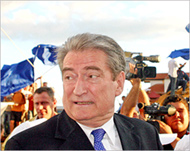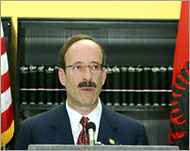Albanians vote for parliament
Albanians have cast their ballots in a key test of whether the tiny Balkan country can break away from its troubled past and hold a free and fair election.

The parliamentary vote on Sunday was a crucial step in the nation’s push to join Nato and build closer ties with the European Union, (EU).
About 2.8 million Albanians were eligible to vote. They chose from 22 political parties and coalitions running for the 140-seat parliament.
About 4760 polling stations opened at 0500GMT for 12 hours. Official results are expected late on Monday.
But international election monitors appeared critical as polls closed.
A preliminary report from the Organiسation of Security and Cooperation in Europe said: “Election day was generally peaceful but a few violent incidents, one fatal, cast a shadow over the process.”
“Parliamentary elections in Albania on 3 July complied only partially with international commitments and standards for democratic elections.”
Previous elections in Albania – sealed off from the world during decades of Communist rule – have been plagued by fraud and irregularities.
Losers have never conceded defeat, badly stalling development in this country of 3.2 million people, among Europe’s poorest.
EU membership
This time, both Nato and the EU have warned Albanian authorities that only free and fair elections will further the Balkan country’s bid for membership.
America has said the poll will be a major milestone in Albania’s transformation into a fully democratic European country and called the election among the most important events since the fall of communism.
 |
|
Sali Berisha says he will cut taxes |
The main contenders in Sunday’s poll – Socialist Prime Minister Fatos Nano and his main rival, Sali Berisha, a former president and leader of the Democratic Party – have stressed that the election is a chance to show the world that Albania’s democracy has come a long way since the fall of communism in 1990.
The two parties have been neck-and-neck, with recent polls giving the Democrats around 35% support and Socialists 34%.
Both leaders have publicly declared that they will resign their posts if they are defeated.
The Socialist Movement for Integration of former prime minister Ilir Meta, who broke away from the Socialists a year ago and is likely to claim third place, can have an important post-election role in creating the government.
Tax pledge
Integration in Nato and the EU is supported by both the Socialists and the Democrats.
Both parties also back close ties with Washington and the Albanian troop deployments in Iraq, Afghanistan and Bosnia.
 |
|
The election will be monitored by |
A key difference is the Democratic Party’s proposal to cut taxes in half to promote investment, an idea the Socialists reject as irrational.
Sunday’s vote will directly elect 100 candidates in constituencies, and 40 will be assigned by a percentage of the national vote.
Parties must win at least 2.5% and coalitions 4% of the vote to enter parliament.
The vote will be monitored by about 500 international observers from the Organisation for Security and Cooperation in Europe, the Council of Europe and a European network of non-governmental organisations.
About 4000 local monitors will also take part.